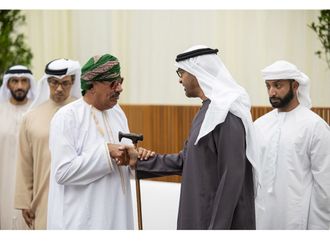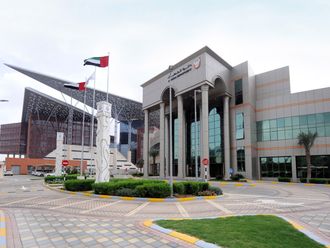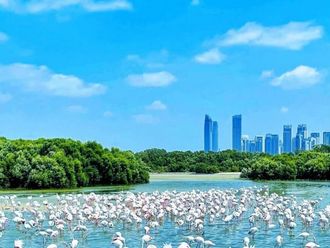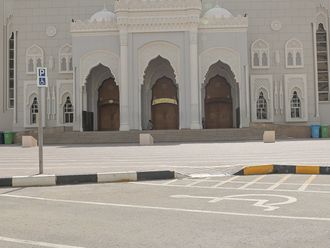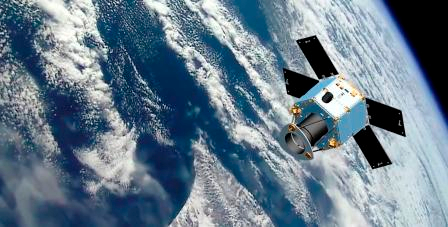
There will come a time when humankind must stand in the light of a new sun. Seeking new, habitable planets has become an endeavour of paramount importance.
Space exploration is an unrivalled activity — noble, infinite and admirable. It is a pursuit of the highest bravery because of its perils — as the Virgin Galactic SpaceShip Two tragedy in October reminded us.
Although the investigation of the cosmos is more often associated with groundbreaking American, Russian and Chinese discoveries, the UAE could become one of the most important space-exploring nations in only seven years. It has already demonstrated its commitment to the space age on several fronts, including observation and tourism.
At the UAE Space Agency launch in October, His Highness Shaikh Mohammad Bin Rashid Al Maktoum, Vice-President and Prime Minister of the UAE and Ruler of Dubai, confirmed the country is aiming to land an unmanned probe on Mars in 2021 to coincide with the 50th anniversary of its formation.
Millions of miles away
Announcing the inception of the Space Agency on Twitter, Shaikh Mohammad said: “We start today a seven-year journey with a national team; through it we will cross hundreds of millions of miles to build globally competitive Emirati individuals.”
The ruler also added, “We chose the epic challenge of reaching Mars because epic challenges inspire us and motivate us. The moment we stop taking on such challenges is the moment we stop moving forward.”
Once built and launched, the probe is expected to take nine months to cross more than 50 million kilometres to reach the Red Planet. Over the next seven years, the Space Agency will work with the Emirates Institute for Advanced Science and Technology (EIAST) to pull off this ambitious programme, Salem Humaid Al Merri, Assistant Director-General for Scientific and Technical Affairs, EIAST, tells GN Focus.
“[The mission] is a strong statement from the federal government showing that the significant investment from the UAE [into space programmes] is a strategic one, aimed at developing science and technology,” says Al Merri.
“It’s not only us wanting these achievements to be in the UAE’s name; we want UAE nationals participating in those missions and having a significant contribution to their success.”
To date, the UAE’s investments in space technologies have exceeded Dh20 billion, according to news agency WAM. Since 2005, EIAST has been working with the Korean company Satrec Initiative to develop satellite technology with a view to establishing an Emirati-run operation in the future. The two agencies have invested up to $100 million (about Dh367 million) to launch two satellites, DubaiSat-1 and DubaiSat-2. A third, KhalifaSat, is expected in 2017.
Entering the space age
Essentially, EIAST’s probes collect data that can be offered to any UAE government ministry, saving valuable time and money spent in gathering intel from foreign satellites.
“DubaiSat-1 was a technology transfer project, with about 30 per cent participation from us. We designed DubaiSat-2 jointly from scratch with Satrec Initiative, which took five to six years,” says Al Merri.
But the development of the much-anticipated KhalifaSat is led entirely by the UAE team. “Satrec is now acting as a consultant only. We’ll be moving the team back to the UAE next year and the project will then be run from here,” adds Al Merri. A launch date and investment figures are not yet available.
Although the UAE ultimately wants to make operations such as those run by EIAST autonomous, engineers and designers will still look overseas if necessary. “We choose the sub-systems and technologies we think are key for us to develop ourselves,” says Al Merri. “But there are some sub-systems or components that you’re better off buying because it costs more to build them from scratch. It’s a make-or-buy decision. We source parts from whoever has the best technology — Germany, the US, Russia or Japan.”
Getting there in stages
In Abu Dhabi, the Mubadala-owned Al Yah Satellite Communications Company (Yahsat) has been working in conjunction with French aerospace specialists EADS Astrium and Thales Alenia Space to develop two satellites of its own. Y1A was sent into orbit in April 2011 and Y1B was launched a year later. Each has an expected lifespan of 15 years. Yahsat partnered with Arianespace and International Launch Services to launch the satellites from the Guiana Space Centre in Kourou, French Guiana.
A third Yahsat spacecraft, Al Yah 3, is slated for launch in the last quarter of 2016, in partnership with the Orbital Science Corporation, who will manufacture it, and Arianespace. This will extend the company’s Ka-band coverage across 16 additional markets in Brazil and Africa.
The technical expertise the UAE is picking up from established space-exploring communities will be invaluable when it comes to its Mars project. So far, barring the Western powers, only India and China have launched Mars missions. The UAE would become the first Arab, Islamic nation to achieve this feat.
In his recent book Mission to Mars: My Vision for Space Exploration, American astronaut Buzz Aldrin brilliantly captured just how elusive Mars has been: “Mars has been flown by, orbited, smacked into, radar examined, and rocketed onto, as well as bounced upon, rolled over, shovelled, drilled into, baked and even blasted. Still to come: Mars being stepped on.”
However, experts believe the UAE could go where none have gone before.
Renowned Algerian astrophysicist Nidhal Guessoum, Professor of Physics and Associate Dean at the College of Arts and Sciences, American University of Sharjah, tells GN Focus the UAE could see the mission through by 2021. “For me this is a similar project to the US Apollo programme of the 1960s — ambitious but doable, challenging and energising for the nation and the region,” he says.
Nonetheless, a lot needs to be done first, from planning to sourcing technical expertise and building the equipment, says Guessoum. “Seven years is just about right, and things must move right away and progress steadily. Hopefully, this will be accompanied by a new interest in educational space programmes.”
A grand quest
Only about 10 per cent of the world’s countries have space programmes. Fewer still have space exploration programmes. Usually, these tend to focus on satellites, but the UAE is already looking beyond our planet’s finite resources.
“The UAE is saying that space is for all humanity, all cultures. Islamic tradition has always stressed on education and science — perhaps now it will show that it wants to contribute to humanity’s grand quests, that its people are thirsty for knowledge and discovery as much as any other,” says Guessom.
Landing a probe designed and manufactured in the UAE on Mars would be a huge achievement for the country’s fledgling space programme. The nation is already making strides in space tourism — Abu Dhabi-based Aabar Investments’ roughly $300 million (35 per cent) stake in Virgin Galactic means the capital will be watching the company’s space commercialisation programmes keenly, especially after Richard Branson, Founder of Virgin Group, said earlier this year that he hopes to build a spaceport in Abu Dhabi by 2016.
However, the SpaceShipTwo accident has dented confidence. Branson and his team are yet to prove that safe commercial space tourism is not only possible but, crucially, also profitable, so there is a fair degree of uncertainty surrounding the industry.
Speaking at the Global Space and Satellite Forum in Abu Dhabi last year, Frank Rose, Deputy Assistant Secretary for Space and Defence Policy, US Department of State, said, “The presence of a spaceport in the UAE will enhance tourism and foreign investment in the region.
“The new space economy will boost diversification of the economy for long-term prosperity.”
The UAE, in particular Abu Dhabi, has become one of the main drivers behind Virgin Galactic. Further to establishing the spaceport in the capital, Mubadala may team up with Virgin to supply or build parts for a spacecraft fleet, George Whitesides, CEO of Virgin Galactic, told Gulf News at the Abu Dhabi Global Aerospace Summit in April.
Whitesides confirmed the British space flight company has held discussions with the Abu Dhabi company. “We’ve had good conversations with Mubadala and other stakeholders in the UAE and we will see where those conversations go.”


